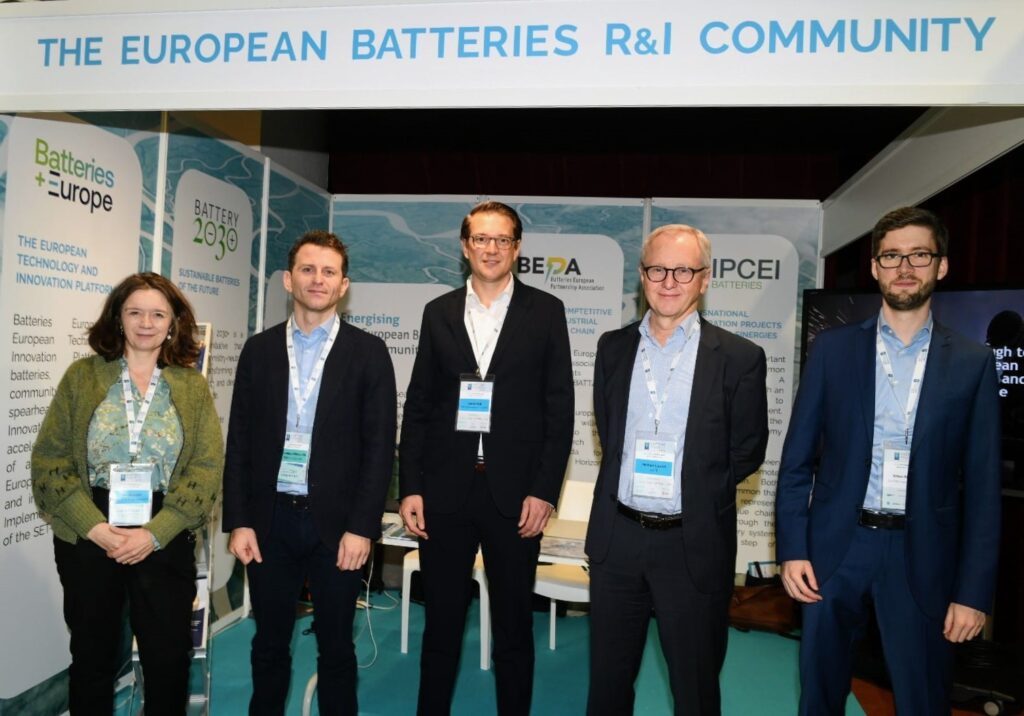
The European Batteries R&I Community

Batteries Europe
Batteries Europe and the BATT4EU Partnership have a similar ambition. However, while Batteries Europe aims mainly at identifying, in a holistic way, all the R&I needs across the battery value-chain at every TRL level; the BATT4EU Partnership focuses on prioritising (within the strategic inputs provided mainly by the ETIP), the most urgent R&I priorities to be addressed within the Horizon Europe Work Programme in order to make the European battery industry more competitive and sustainable.
Because of their similarities, the two initiatives collaborate closely. Currently, BEPA and Batteries Europe are working in integrated working groups to develop together a common Strategic Research and Innovation Agenda, to give a unified voice for the European battery research community. Along with this, BEPA and Batteries Europe also work together in Task Forces on transversal topics across the battery value chain. Finally, Batteries Europe also serves as an Advisory Committee in BEPA facilitating information exchange and coordination between the Horizon Europe Partnerships, Member States, relevant regions and other structures directly addressing different parts of the batteries value chain.

Battery 2030+
The BATT4EU Partnership has built a strong collaboration with the BATTERY 2030+ initiative (Coordination and Support Action funded under the Horizon 2020 programme) which is the large-scale and long-term European research initiative with the vision of inventing the sustainable batteries of the future, providing European industry with disruptive technologies and a competitive edge throughout the battery value chain.

IPCEIs
In December 2019, the European Commission approved under EU State aid rules a first Important Project of Common European Interest (“IPCEI”) jointly notified by Belgium, Finland, France, Germany, Italy, Poland and Sweden to support research and innovation in the common European priority area of batteries. The seven Member States will provide in the coming years up to approximately €3.2 billion in funding for this project, which is expected to unlock an additional €5 billion in private investments.
Objective
More specifically, the project focuses on 4 specific areas:
- Raw and advanced materials: The project aims to develop sustainable innovative processes allowing extraction, concentration, refining and purification of ores to generate high-purity raw materials. With respect to advanced materials (such as cathodes, anodes and electrolytes), the project aims to enhance existing materials or create new ones, to be used in innovative battery cells.
- Cells and modules: The project aims to develop innovative cells and modules designed to meet the safety, and performance required for both automotive and non-automotive applications (e.g. stationary energy storage, power tools, etc.).
- Battery systems:The project aims to develop innovative battery systems including battery management software and algorithms as well as innovative test methods.
- Repurposing, recycling and refining: The project aims to design safe and innovative processes for collection, dismantling, repurposing, recycling and refining of recycled materials.
A second project complements the first IPCEI and using the same investment scheme was approved by the Commission in January 2021.
Called “European Battery Innovation”, this project was jointly prepared and notified by twelve Member States (Austria, Belgium, Croatia, Finland, France, Germany, Greece, Italy, Poland, Slovakia, Spain and Sweden) who will provide up to €2.9 billion in funding in the coming years to further support research and innovation in the battery value chain.
Objective
The project will cover the entire battery value chain from extraction of raw materials, design and manufacturing of battery cells and packs, and finally the recycling and disposal in a circular economy, with a strong focus on sustainability. It is expected to contribute to the development of a whole set of new technological breakthroughs, including different cell chemistries and novel production processes, and other innovations in the battery value chain, in addition to what will be achieved thanks to the first battery IPCEI.




